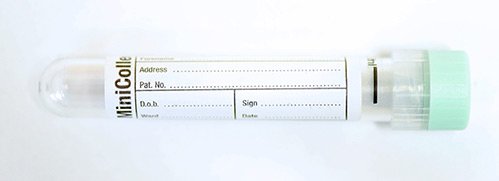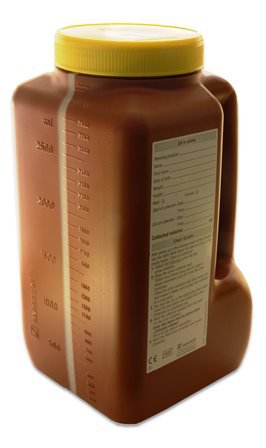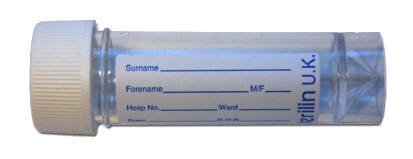Calcium
Chemical Pathology
Notes
Total calcium is measured in serum or lithium heparin plasma but can also be measured in urine, particularly when investigating the cause of a raised blood calcium level and wishing to exclude familial hypocalciuric hypercalcaemia or in the context of the formation of renal calculi.
Blood for measurement of total calcium should ideally be drawn from a vein in which the blood is free-flowing (that is without a tourniquet) because venous stasis can result in falsely raised calcium levels. In practice 2-3 minutes of venous stasis has a negligible effect.
Total and adjusted calcium form part of the "bone" profile along with alkaline phosphatase, total protein, albumin but can also be requested separately.
Sample requirements
For adults, blood taken into a 5mL gold top tube (or rust top for the Acute Unit)

For children, blood taken into a 3.5mL rust top tube

For neonates, blood taken into a 0.8mL minicollect lithium heparin tube. Please list the tests of particular interest so that some priority can be given to analysis if plasma volumes are small.

For urine calcium in adults a 24 hour urine collected into a 3L brown bottle is required.

For random urine calcium:creatinine ratios in children the second passed morning urine sample should be collected into a 30 mL white top Universal

Storage/transport
Send samples at ambient temperature to the laboratory. If unavoidable, samples for calcium can be stored refrigerated overnight but blood samples will not then be suitable for phosphate assay, a test which is often also of interest when calcium is requested.
Required information
Relevant clinical details including medication. For 24 hour urine collections, please state clearly start and finish dates and times.
The labelling of the request form and the sample must conform to the Policy for Specimen and Request Form Labelling for Pathology Users.
Turnaround times
The assays are run throughout the day and night.
The in-lab turnaround time is normally less than 24 hours.
The test can be ordered as an urgent request.
Reference ranges
Serum/plasma total calcium: 2.20–2.63 mmol/L
(NB: apparently raised total calcium levels up to 3.00 mmol/L in 0–3 month infants and up to 2.80 mmol/L in children up to 12 months old are unlikely to be clinically significant)
Adult 24h urine calcium: 2.2–7.5 mmol/24h
For children age 1–15 years, urine calcium:creatinine reference range is less than 0.74 mmol calcium/mol creatinine*
*this reference range for children refers to the second urine passed after an overnight fast. Calcium excretion exhibits considerable diurnal variation and urine samples collected at other times may be falsely raised.
Further information
Since the metabolically active form of calcium is in the ionized state, and approximately 40–50% of the measured total calcium is bound to albumin, the serum concentration of albumin should be taken into account when assessing the serum calcium levels. Numerous formula have been applied, in various clinical situations to "adjust" the measured calcium in the context of albumin levels. The "adjusted calcium" is an approximation of the metabolically active calcium with errors greatest at extremes of albumin concentration and when there is suspicion or evidence of acidosis or alkalosis.
The formula that is routinely applied in this laboratory is
Adjusted Calcium = Measured Calcium + ( (Albumin concentration - 40) x 0.013)
The formula should not be applied to albumin concentrations less than 10 g/L or when the patient is known to be acidotic or alkalotic.
To learn more about calcium visit Lab Tests Online or access the ACB monograph for Calcium by selecting from the list at this site.
Page last updated: 01/10/2021